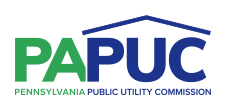PUC Offers Tips on Door-to-Door and In-Person Energy Sales; Urges Consumers to be Aware of Their Rights and Options
 The Pennsylvania Public Utility Commission (PUC) today offered consumer tips on door-to-door sales and marketing activities by agents of competitive electric and natural gas suppliers, reminding consumers of their rights as well as their options when it comes to shopping for and selecting a competitive supplier for natural gas or electric service.
The Pennsylvania Public Utility Commission (PUC) today offered consumer tips on door-to-door sales and marketing activities by agents of competitive electric and natural gas suppliers, reminding consumers of their rights as well as their options when it comes to shopping for and selecting a competitive supplier for natural gas or electric service.
“Pennsylvania has clear rules regarding energy sales practices, and the PUC encourages consumers to understand these important protections,” said Gladys Brown Dutrieuille, PUC Chairman. “PUC regulations provide consumers with layers of protection to help them recognize deceptive sales practices and avoid falling victim to unscrupulous sales agents.”
With spring’s arrival, warmer weather and more daylight, the Commonwealth traditionally sees an uptick in door-to-door sales and marketing activity by competitive suppliers. In Pennsylvania, from April 1 through Sept. 30, hours for door-to-door sales and marketing expand one hour, from 9 a.m. to 8 p.m. When a local ordinance has stricter limitations, a supplier must comply with the local ordinance.
Also, with increasing outdoor and in-person public events, consumers should seek identification to verify whether they are speaking with a representative from a utility, from a licensed energy supplier, or from the PUC or another state agency.
Consumer Tips for Door-to-Door Energy Sales
Pennsylvania regulations require suppliers to obtain criminal background checks on all of their door-to-door agents. Additionally, agents who conduct door-to-door activities, or appear at public events, are required to wear an identification badge, and consumers should immediately seek proper identification before engaging a door-to-door salesperson.
The identification badge must:
- Accurately identify the supplier, including its trade name and logo;
- Display a photograph of the sales agent;
- Show the full name of the sales agent;
- Be prominently displayed; and
- Include a customer-service phone number to contact the supplier.
Upon first contact with a customer, an agent must identify himself/herself by name, the energy supplier being represented, and the reason for the visit.
Energy sales agents must make clear that they are not working for, and are independent of, the customer’s local utility or any other supplier. Additionally, agents may not wear apparel or accessories – or even carry equipment containing branding elements – that suggests a relationship with a utility, government agency, or other supplier.
Avoiding Deceptive or High-Pressure Sales
The PUC urges consumers to avoid intimidating sales pitches pressuring them to act now, reminding them that they are not required to choose a competitive supplier for their electricity or natural gas supply. However, should they elect to enter into a contract with a competitive supplier, residents should expect the following once the supplier’s sales agent completes a transaction:
- Before the agent leaves the residence, the customer should receive a copy of each signed or initialed document relating to the transaction;
- The agent must explain the supplier’s verification process that is used to confirm the customer’s intent to switch suppliers;
- The agent must provide the customer with a full disclosure statement with all contractual terms and conditions along with a shorter contract summary that highlights the most important terms; and
- Agents must remind customers that they may rescind the transaction within three business days after receiving the disclosure statement.
Agents must immediately leave a residence when requested to do so, and furthermore must honor a customer’s request to be exempted from future door-to-door sales and marketing activities. Upon receipt of such a request, the agent notifies the supplier, which removes the customer from their databases within two business days.
Customers facing an aggressive sales agent or suspecting a potential scam are urged to contact the PUC’s Bureau of Consumer Services at 1-800-692-7380 and consider filing an informal complaint. Consumers who feel threatened or are concerned about their safety should contact local authorities to report the incident. The complete list of regulations governing marketing and sales practices for Pennsylvania’s retail residential energy market is found at 52 Pa. Code, Chapter 111.
Energy Shopping Options with PAPowerSwitch, PAGasSwitch
In addition to door-to-door sales, consumers have other avenues to shop for their electric generation or natural gas supply. For both industries, the PUC operates neutral, independent websites in www.PAPowerSwitch.com (electric) and www.PAGasSwitch.com (natural gas) where 24 hours a day, seven days a week consumers can access current supplier offerings, consumer education fact sheets, and information on energy efficiency and conservation.
The PAPowerSwitch and PAGasSwitch websites can be used to shop for energy supply offers, and they can also be used to check or compare offers that consumers may receive by phone, mail or in-person – helping consumers identify options that may be most valuable to them.
About the PUC
The Pennsylvania Public Utility Commission balances the needs of consumers and utilities; ensures safe and reliable utility service at reasonable rates; protects the public interest; educates consumers to make independent and informed utility choices; furthers economic development; and fosters new technologies and competitive markets in an environmentally sound manner.
Visit the PUC’s website at www.puc.pa.gov for recent news releases and video of select proceedings. Search for the “Pennsylvania Public Utility Commission” or “PA PUC” on your favorite social media channel for updates on utility issues and other helpful consumer information.